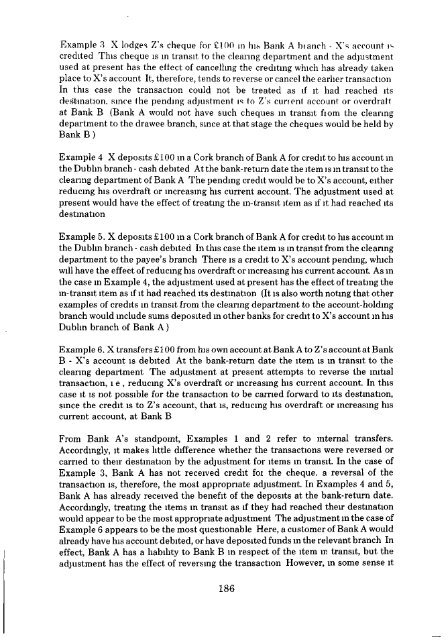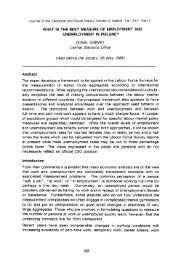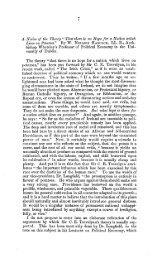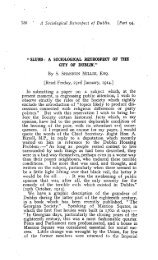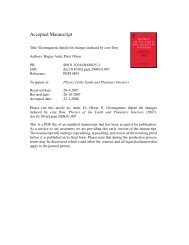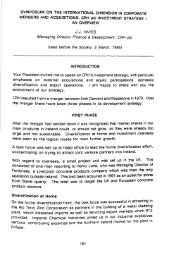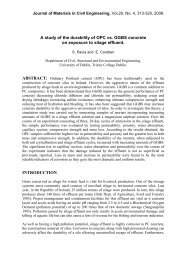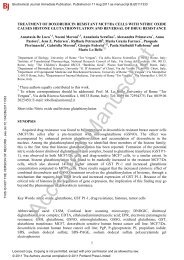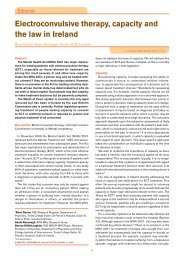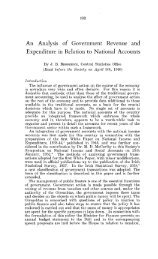parti: objectives and features of the new reporting system 159 - TARA
parti: objectives and features of the new reporting system 159 - TARA
parti: objectives and features of the new reporting system 159 - TARA
You also want an ePaper? Increase the reach of your titles
YUMPU automatically turns print PDFs into web optimized ePapers that Google loves.
Example 3 X lodges Z's cheque for £100 in his Bank A bianch - X's account 1^<br />
credited This cheque is in transit to <strong>the</strong> clearing department <strong>and</strong> <strong>the</strong> adjustment<br />
used at present has <strong>the</strong> effect <strong>of</strong> cancelling <strong>the</strong> crediting which has already taken<br />
place to X's account It, <strong>the</strong>refore, tends to reverse or cancel <strong>the</strong> earlier transaction<br />
In this case <strong>the</strong> transaction could not be treated as if it had reached its<br />
destination, since <strong>the</strong> pending adjustment is to Z's current account or overdraft<br />
at Bank B (Bank A would not have such cheques in transit fiom <strong>the</strong> clearing<br />
department to <strong>the</strong> drawee branch, since at that stage <strong>the</strong> cheques would be held by<br />
Bank B)<br />
Example 4 X deposits £100 in a Cork branch <strong>of</strong> Bank A for credit to his account in<br />
<strong>the</strong> Dublin branch - cash debited At <strong>the</strong> bank-return date <strong>the</strong> item is in transit to <strong>the</strong><br />
clearing department <strong>of</strong> Bank A The pending credit would be to X's account, ei<strong>the</strong>r<br />
reducing his overdraft or increasing his current account. The adjustment used at<br />
present would have <strong>the</strong> effect <strong>of</strong> treating <strong>the</strong> in-transit item as if it had reached its<br />
destination<br />
Example 5. X deposits £100 in a Cork branch <strong>of</strong> Bank A for credit to his account in<br />
<strong>the</strong> Dublin branch - cash debited In this case <strong>the</strong> item is in transit from <strong>the</strong> clearing<br />
department to <strong>the</strong> payee's branch There is a credit to X's account pending, which<br />
will have <strong>the</strong> effect <strong>of</strong> reducing his overdraft or increasing his current account. As in<br />
<strong>the</strong> case in Example 4, <strong>the</strong> adjustment used at present has <strong>the</strong> effect <strong>of</strong> treating <strong>the</strong><br />
m-transit item as if it had reached its destination (It is also worth noting that o<strong>the</strong>r<br />
examples <strong>of</strong> credits in transit from <strong>the</strong> clearing department to <strong>the</strong> account-holding<br />
branch would include sums deposited in o<strong>the</strong>r banks for credit to X's account in his<br />
Dublin branch <strong>of</strong> Bank A)<br />
Example 6. X transfers £100 from his own account at Bank A to Z's account at Bank<br />
B - X's account is debited At <strong>the</strong> bank-return date <strong>the</strong> item is in transit to <strong>the</strong><br />
clearing department The adjustment at present attempts to reverse <strong>the</strong> initial<br />
transaction, I e , reducing X's overdraft or increasing his current account. In this<br />
case it is not possible for <strong>the</strong> transaction to be carried forward to its destination,<br />
since <strong>the</strong> credit is to Z's account, that is, reducing his overdraft or increasing his<br />
current account, at Bank B<br />
From Bank A's st<strong>and</strong>point, Examples 1 <strong>and</strong> 2 refer to internal transfers.<br />
Accordingly, it makes little difference whe<strong>the</strong>r <strong>the</strong> transactions were reversed or<br />
carried to <strong>the</strong>ir destination by <strong>the</strong> adjustment for items in transit. In <strong>the</strong> case <strong>of</strong><br />
Example 3, Bank A has not received credit foi <strong>the</strong> cheque, a reversal <strong>of</strong> <strong>the</strong><br />
transaction is, <strong>the</strong>refore, <strong>the</strong> most appropriate adjustment. In Examples 4 <strong>and</strong> 5,<br />
Bank A has already received <strong>the</strong> benefit <strong>of</strong> <strong>the</strong> deposits at <strong>the</strong> bank-return date.<br />
Accordingly, treating <strong>the</strong> items in transit as if <strong>the</strong>y had reached <strong>the</strong>ir destination<br />
would appear to be <strong>the</strong> most appropriate adjustment The adjustment in <strong>the</strong> case <strong>of</strong><br />
Example 6 appears to be <strong>the</strong> most questionable Here, a customer <strong>of</strong> Bank A would<br />
already have his account debited, or have deposited funds in <strong>the</strong> relevant branch In<br />
effect, Bank A has a liability to Bank B in respect <strong>of</strong> <strong>the</strong> item in transit, but <strong>the</strong><br />
adjustment has <strong>the</strong> effect <strong>of</strong> reversing <strong>the</strong> transaction However, in some sense it<br />
186


